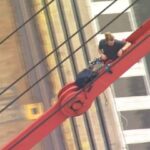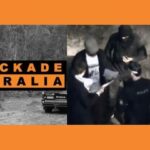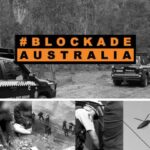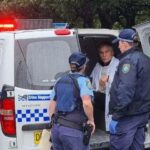Good Luck if Government Thinks It’s Shutting Down Climate Action, Says Father of Gaoled Activist
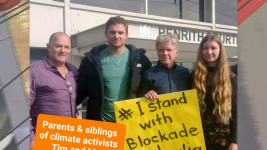
Blockade Australia activists Max Curmi and Tim Neville have just served three weeks in Parklea Prison, not because they’ve been convicted of a crime but as they were refused bail, despite being nonviolent climate defenders posing no real harm to the public.
The pair were arrested during a botched raid at a property in Colo on 19 June, where a group of activists were staying. Those camped out foiled a NSW police spying operation which they were the target of, when a few climate defenders noticed camouflaged officers hiding in the bushes.
Seven protesters were arrested. Then, as has become the usual over the last year, most arrestees were slapped with draconian bail conditions, while those that could be, were sent to stew inside.
Early on Tuesday afternoon, a magistrate released Max and Tim, which was the want of a rising grassroots campaign. But questions are being raised as to the legitimacy of using pre-conviction mechanisms, like bail and remand, to punish those who aren’t a risk to the public.
Sanctioning the messengers
In its first foray, Blockade Australia carried out two successful weeks of direct actions at Newcastle Coal Port. The group arrived as a product of a rising street protest movement, which, while receiving increasingly harsh penalties, wasn’t seeing government take action on climate.
Blockade then descended upon Sydney’s Port Botany for five days in March. Max Curmi was arrested and remanded for two weeks for his part in the demonstrations. While, around the same time, Fireproof Australia was carrying out a series of road blockages across Sydney.
The Perrottet government responded by enacting the harshest anti-protest regime in the land. This involves penalties of up to 2 years imprisonment and/or a $22,000 fine for obstructing roads, bridges, tunnels and major facilities. Prior to this, blocking a road could set you back around $400.
So, a fortnight ago, when Blockade Australia hit the streets for its third series of actions targeting the Sydney CBD, the Liberal Nationals had raised the stakes so that campaigning to save the Earth now involves a serious loss of liberty.
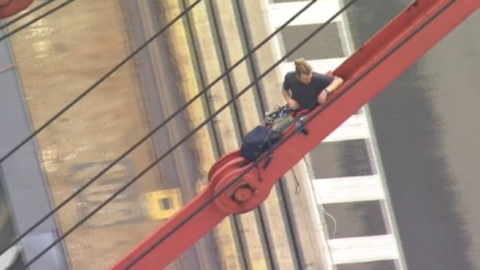
Public enemy number one
The heightened penalisation of climate actions has cast nonviolent activists as serious criminals. And the talkback radio narrative asserts that delaying peak hour traffic for an hour is somewhat more detrimental than the floods, the bushfires, drought, and Pacific Island nations going under.
Tim O’Donnell, Max’s father, arrived in Sydney earlier this week, prepared to carry out a series of sit-ins outside NSW parliament to call out the overbearing treatment of his son. And he addressed the Defend the Right to Protest speakout at Hyde Park on Monday.
Sydney Criminal Lawyers spoke to Tim O’Donnell just after his son was granted bail at Penrith Local Court, and what he had to say certainly upended the idea that the parents of these “hardened” climate defenders might be standing next to Dominic Perrottet nodding along in disapproval.
Tim, your son, Max Curmi, has just been granted bail, after spending close to three weeks detained in Parklea Prison. He was in there since 17 June when the NSW police raided a property in Colo Valley, where activists were camped out.
How are you feeling about Max being released?
It’s great. They’re still on very strict bail conditions, and they’ve got charges pending, which is a worry. But it’s great that they’re out.
Their treatment in Parklea, from all accounts, has been pretty suspect and bad. So, at least they’re out of there, which is the main thing.
Max has just been remanded for three weeks, as he was denied bail, yet he’s a nonviolent activist, who shows no real threat to the community.
So, how do you consider the treatment of your son at the hands of NSW authorities?
It’s draconian. It’s over the top. These people aren’t a threat to society. In fact, they’re trying to protect society and the future of our planet.
Obviously, that’s not what the state thinks, and the state might somehow feel threatened by them.
But the community is certainly not threatened by them. And they would never do anything as they’re peaceful nonviolent protesters. They’re dedicated towards that mode of action.
It’s really heavy-handed. And look, there are probably a few technicalities as they both had corrections orders, which was an issue. But it depends very much on the magistrate you get at the time.
Max was remanded for two weeks back in March as well, when the police arrested him over a nonviolent action at Port Botany.
The media has been demonising Blockade Australia activists and indeed, all nonviolent climate defenders. From the depictions on television, one might assume the parents of activists frown upon their actions.
But you’re actively speaking out in support of Max, so how do you consider his actions and those of Blockade Australia?
I consider them highly appropriate to hopefully remedy the situation because, without direct action, our political and social processes aren’t going to get us to the point where we need to get to with climate change.
I’m all for direct action. Looking at actions like those in Newcastle, groups like Blockade Australia have been pushed to the point where they have to disrupt the public, because when they disrupt the culprits, the coal and gas industry, it’s not publicised.
There’s no publicity. They’re still targeted by police with new sentences and, again, a whole range of bail conditions. So, they get the same treatment, but not the publicity.
In a way, they get pushed into this corner, where if you want publicity, you’ve got to do it in Sydney or Melbourne or somewhere that society is going to take notice.
It’s a necessary thing. In an ideal world, we wouldn’t have to do that, but this is not an ideal world.
Blockade Australia is doing a great job. I thoroughly support it. I have had arguments with Max about the pointy end of the details, but again, that’s often quite theoretical and not based on the actualities, which I often don’t know about.
So, I have a lot of trust in the people who are working together to do this. They’re hugely dedicated to doing the right thing for the future of our planet. A lot of people are.
Over the last three weeks since this has all unfolded, I’ve had discussions with people, and there’s a lot of support out there.
There might be a few grumpy people who got blocked in traffic, but they’re in the minority, while you’ve got a lot of people that, once they start to understand the situation, say, “Yeah, you’re right.”
We can sit back and be quiet Australians, hoping that our democratic processes work. But they’re not. It’s not going to get us to as far as we need to get in the short amount of time we have.
That’s my concern. I’ve got a real concern that we’re not going to do enough, and one of the tipping points in our natural planetary system is going to kick in, and we’re going to be in all sorts of trouble.
As far as I’m concerned, the more we can do the better.
Again, ideally, if there were a lot more numbers doing something, then we wouldn’t need activists taking either legal risks or physical risks, and that would be a lot better. But the trouble is getting people out there and getting them engaged.
There are a whole lot of reasons why what’s happening now needs to happen. And it will continue to happen.
Some of the activists have very strict bail conditions placed on them, but that doesn’t mean there’s not a lot of other people. For every one of them, there’s probably ten others who know the details and are hugely concerned and are now inspired to do more.
So, it’s like, good luck to the government if they think they’re going to shut down climate action, because they’re not going to. And the more punitive they get, the more action there’s going to be. So, they’re just not going to succeed in that line.
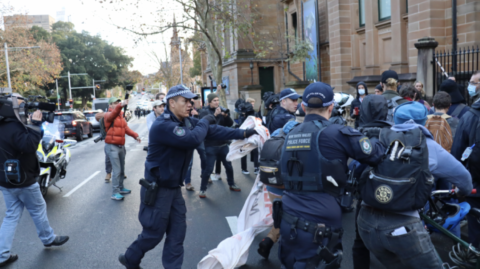
Around the time of the Port Botany actions the Perrottet government dramatically increased the penalties that apply to obstructing a street, a bridge, a tunnel or a major facility.
How do you consider this response from authorities to people in the community trying to raise awareness around the climate crisis? Where’s this toughening of the laws going to lead?
It’s an indication that our democracy is broken, really, because in an ideal world, our democracy is supposed to listen to all of the community – and they’re not.
They’re not listening to a very large portion of the community that’s highly concerned about climate change.
They might listen to their lobbyists, who are paying them millions of dollars in donations, but they’re not listening to the large portion of society that wants something done.
As a response to that heightened level of direct action that comes out of the frustration and need to force change, the government is going the wrong way again. They’re making things tighter and tighter. It’s pushing things, more and more, to the extreme.
If they keep pushing things, what happens? Where do they want this to go?
The better solution would be to sit down, open the doors and talk to climate activists – talk to the experts, like Saul Griffiths, who wrote The Big Switch.
All of the solutions are out there. There’s plenty of advice that government can take on this, but what do they choose to do is target activists rather than climate change.
They’re just misusing their powers and resources. In my opinion, it’s just going the wrong way with these laws.
It’s reminiscent of what we saw in Hong Kong. People are being followed two days after and being arrested in cafes for doing little more than walking on a road. It’s pretty full on, and a lot of people don’t know those details.
Yes, Australians might be disappointed if they get blocked on the road, but they’d also be disappointed to find out that people are being harassed big time over this. A lot of people’s lives are being made difficult at this time.
There is a mood out there amongst activists, and there is fear out there. That’s what the government is wanting. But fear is not a great action from government. It’s not something I would condone.
I would like our governments to be inspiring and talk with community, and act on its behalf. That’s what they’re supposed to do. But it’s not what they’re doing.
So, you’re saying that simply slapping tougher laws and penalties on as a response to rising climate action is going to escalate it?
I can’t see how it wouldn’t because climate activists are not going to give in. They’ll obey bail conditions and do the right thing when they have to, no doubt about it, because you’d be stupid not to, but they’re not going to stop altogether.
A lot of people have been dedicated to this cause for most of their lives, I know Max has. Max has been involved in climate action since he was literally 12. He is nonviolent. And he wouldn’t do anything to hurt society or community. He’s all about helping the community.
But he certainly wouldn’t sit back down because the government tells him to, and nor would I.
There’s a level of fear. I would be fearful about doing direct action and locking on. You know, I would never personally do any of that. But I’m thinking about it, and I’m much more motivated now than I was four months ago. And I’m not alone.
A lot of people I talk to have been fairly passive participants with groups, like Extinction Rebellion. And these people, who share those philosophies, are now thinking we’ll get involved.
Apart from the government being morally wrong, protest has always been an important part of our democratic system, which is not great, but without protest it would be a much lesser system.
If we’re going to call it a democracy, then we need to give people the right to protest. We can’t have a situation where the government is in control of who can protest and who can’t.
If protesters are doing things that are disruptive or damaging to society, then that can be looked at on its own merits. But people should have the right to protest.
I certainly don’t condone damaging things, but it’s just an essential part of where we have got to in society. And we haven’t got far enough.
We wouldn’t be where we are if we didn’t have people demonstrating over Black Lives Matter or whatever the cause. Demonstration has always been a huge part of it.
So, Tim, now Max has been released on bail, what’s next?
We’re heading back to Victoria. For Max, it will mean he won’t be involved with things over the next little while. And for the others who are on bail, I gather it’s the same, with similar conditions across the board.
That’s just short-term though, because eventually these things will be heard, and I’d imagine, when the hearings happen, some of the things will start coming out about the Colo raid.
That will be fairly embarrassing for the police and the government, because it was a fairly weird, botched raid from what I could see.
A lot of the statements from the police are very different from the statements from activists, who I trust thoroughly. That’s right down to who was where. Some of the activists weren’t even in the vicinity of the car that was stopped but have been charged.
That will come out in time. I’m confident of it. It may not be a big enough story to make the news or get public opinion, but it will free up those people for a while and it might make the government think.
The police have probably got a slush fund to pay off people who’ve been gaoled inappropriately. Police forces assume it will happen. They take risks and they don’t really care because they know they can pay people off.
It’s a weird system. And I really wouldn’t have known just how weird it is if this hadn’t started unfolding.


